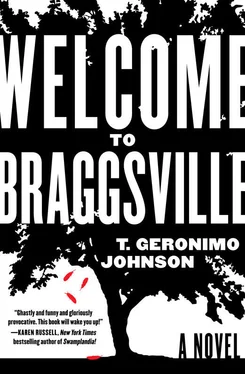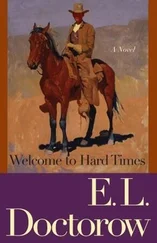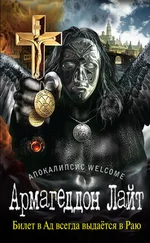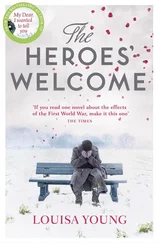D’aron feels the Amen! in his chest, it could shake the barnacles loose.
Run on back to your momma. The deacon winks at little Ricky and says, Thank you for the break.
The congregation laughs again, so loud, rushing out the sound of the chain against the steps. Woodbridge is barely ten feet into the hall, and has another ten to reach the pulpit when the anchor comes buckling through the doorway. It is rusty and flaking, encrusted with a colony of oddities collected during its obviously long sojourn, and packs a sneaky reek, too, bearing in tow the briny odor of Port Savannah and a smidge of the rotten smell, that sickly sweet tang of decay haunting Tollenridge marsh, and lastly, a sniff of haint not unlike the Oconee eddies, those brown swirls downriver from the mill, where the refuse and metal filings caught in the whorl stain the sides of algae-slick rocks. It smells like all those places D’aron hates, and the deacon’s shortened strides — out of exhaustion, or wary of knocking over the pulpit, he doesn’t know — make it appear an unseemly act, one to be performed under cover of night.
The anchor an offering before the pulpit, deacon and preacher both lay hands on it and murmur, eyes closed, one even making the gestures reserved for rebuking demons, fingers spread, palm thrust forward. After a few moments they appear satisfied. The preacher returns to the dais and fans himself.
Deacon Woodbridge clears his throat. Is it a coincidence that the anchor figures a cross? Take a look. Look through the dirt and the grime, the barnacles and rust. See what it was and what it can do. He motions with his hand as if cleaning a window — small — Look through the aging and see it as God sees you. Can you see it now? Can you see how the anchor figures a cross? He points to the cross on the wall and everyone nods.
Is that a coincidence? I see some of you nodding. Do you believe in coincidence? He is whispering now. Then you are in the wrong place. Louder, he is now. I believe in God, and God don’t make coincidences. Coincidence! Louder yet. That’s what we say when we don’t want to give Him on High credit, or we need to deny the truths that face us, when the writing is on the wall and we do not want to read it. It is a coincidence, we say. But no. This is no coincidence that the anchor figures the cross. Too many of you think that God is like that energy drink everyone is drinking in the cities. He points around the room with an index knotted by arthritis. Gives you wings, you think. You see these angels and want to fly. But you’re not for that in this life. In this life, Jesus is like this anchor, he grounds you. See, you’ve been thinking, I’ll fly over and do this and that, and fly back over to church on Sunday for a refill. It’s not like that.
He pulls a bag from behind the pulpit and dumps it on the floor. Cigarettes, a fifth of dark liquor, and what appears to be a men’s magazine, judging from the cover, fall at his feet. Gulps and gasps from menfolk as the little ones’ eyes are covered and the big ones’ slack jaws are smacked. He snaps his fingers, and little Ricky places one of the items in each far corner of the church, out of the deacon’s reach. The deacon walks first in one direction, then the other, stopped each time by the chain.
Your battle is with yourself. That’s why you need Him. There was no Cain and Abel.
A ripple of confusion passes across the congregation, flurries and snatches of protest take flight like startled pheasants.
Listen! Not, listen, but Listen! Once only. The voice cannot, will not, be denied. Even the preacher touches his heart and crosses himself. The deacon speaks, but is no longer the speaker, is no more a speaker than a speaker is a record, than that record is a musician, than that musician is any more than a speaker for Him than whom none greater can be imagined.
They were one man, Cain and Abel. One man. That’s called symbol, allegory, metaphor. Metaphor means to carry. Like we each carry in us Cain and Abel, Jacob and Esau. Abel speaks for Jesus. He is this anchor, keeps us on track and out of harm’s way, keeps us sane and safe. And what do we want to do with that anchor? What do we want to do come Sunday night, or Monday night, or Tuesday night, or for you all with long memories, last Saturday night at Bobby Ray Johnston’s? That is right, we cut it loose. That’s right! We cut it loose, the way Cain laid out Abel. But it is Cain who has to die. Hear that. Cain must die for us to live forever. Problem is Cain is just too much fun. Never yet heard of some fellas running out Friday night to raise some Abel.
Laughter.
Oh yes, laugh. When you do, I know you heard. This week, head out there and raise some Abel.
Following the sermon, a procession to the river, the preacher in the lead, trailed by flowing white robes, a pageant of bellflowers to be submerged one by one and anointed, as John did for Jesus, as someone certainly did for John. Gentle, so gentle they are, cradling Nana’s head like two clumsy children entrusted with a precious egg. She stands, her eyes sparkle, and D’aron is possessed by a rush, a true possession it feels — Alleluia! — as he scurries toward her, halting as she clears the water. The eyes aglow, yes, but her body is the same, and as she struggles to pilot it ashore, he wants to look away — but cannot — from the new sheer skin she wears, from the low orbs at midrib — staring at the wild tangle beneath. In her grasp, in her clutches, she smells still sickly, only now wet on top of it, and her hands frisk him, playing along his spine as if in search of the songs of youth. And after the baptism a ritual he was not allowed to witness but imagined all the more, knowing as he did the sounds of slaughter and recognizing, even at that pitch, Nana’s voice.
He didn’t sleep well for three days afterward. When he complained of it, Nana blessed him with juniper oil and warned him to never go back there alone.
Toward the end his nana suffered olfactory illusions, the doctors had a word for that, but it made her sound mentally deranged. (Maybe Candice wasn’t so wrong to challenge Hirschfield for referring to Louis as the deceased.) Nana was always smelling things that weren’t there — fire, and charred wood, and burning grass, and blood. Clouds, she once claimed. For years, D’aron admitted it to no one, but he thought that if kids and old people truly were closer to the Lord, maybe she did smell something. He mentioned it to no one except Charlie early the morning of the Incident, expecting him to understand, but he only shrugged. Why are you telling me now? Daron shrugged back. He’d been smelling something burning since dawn, but didn’t say it. Later there was smoke on the horizon and he figured that was it, someone burning trash.
As one professor would have said, It’s just the mind playing tricks on us to rationalize what it can’t explain. It’s how religion started.
It was all a trick of the mind. Of course. He couldn’t be remembering it right.
Couldn’t be.
Couldn’t be.
All that chatter rattling about the Holler was hearsay, not a lick true, but as he climbed Mosby Ridge and descended south into the shallow vale, he would have preferred anything to what he was facing, setting off in the opposite direction of the meadow he’d run as a child and over the rise that separated Smiths from Houstons, town to the west clear as day, the scattered trailers to the east obscured as always by the obstinate thicket that brooked not even wind, then bearing due north to descend into the Holler.
Nope, none of the chatter was true, but he plumbed his memory nonetheless, sounding the words out until the rhythm rang right, and he knew for certain it was two steps back and one to the right before entering the Holler at night.
Читать дальше
Конец ознакомительного отрывка
Купить книгу












